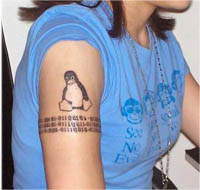 |
In honor of Software Freedom Day, I am making a concerted effort to install Ubuntu on one of my computers. I would much rather be hanging out at Bug Fest in Raleigh, but I don’t have the gas money or time this weekend. Unlike all my previous attempts to install that stupefyingly complex OS, Linux, I hear Ubuntu is much more accessible. We’ll see.
Software Freedom isn’t just about shareware, copyrights, and copylefts. It’s about transparency in applications that have become an indispensable part of our lives. If we don’t have access to what’s going on under the hood of Microsoft Windows or Mac OS, then we are susceptible to unscrupulous corporate schemes such as the Sony Rootkit Scandal, where the company installed spyware on computers playing its CDs, opening security holes for viruses and crashing Windows computers everywhere.
Closed-source software also prevents users from being a part of computer science, stifling programming innovation and competition. Every single time a new version of Windows has come out, I’ve had to buy a new computer to support it. Open-source operating systems don’t get more bloated and hardware-intensive with new versions. They get more efficient and more secure, because everyone is hacking them and everyone is improving them. Microsoft Vista is bad for the environment, and I’m not installing it. Fart on you Bill Gates.
 |
Here are some of my favorite open-source projects:
Ubuntu: An operating system with a philosophy. That alone makes this user-friendly flavor of Linux way past cool. There are many flavors of Ubuntu also, from the children’s educational Edubuntu to the scientific Scibuntu. The world “Ubuntu” is a Southern African in origin and reflects the ethics of humanist philosophy. My favorite translation of the word is, “I am because you are.”
One Laptop per Child (OLPC): Although these laptops have failed in their goal of coming in under $100, the OLPC laptops do include some incredible design innovations, from a hand-crank power source to a picture-based operating system that overcomes language and literacy barriers. The laptops will bring Internet access to third world countries and will automatically network with other OLPCs in their vicinity.
Freedom Toaster: The first world is flooding the third world with our old computer equipment, and we all know Microsoft doesn’t support anything but its latest version of Windows; therefore, these countries must turn to open-source operating systems to bring them into the Information Age, but access to such programs are difficult when you don’t have an internet connection. Freedom Toasters are computer kiosks running Ubuntu that are set up to burn CDs of the latest open-source softwares for distribution and overcome the bandwidth hindrance.
MIT OpenCourseWare: Open source is egalitarian. If everyone has access to the Internet, then theoretically everyone could have access to a College Education. MIT is working to make this a reality by putting videos of their courses and course materials online for free.
Open Office: This software is just like Microsoft Office, fully compatible with Microsoft document file types, and it’s free and open source. I’ve heard mixed reviews from fully positive to cautiously positive. My attempt to get it running today failed miserably, but that might be a bad hard drive in what is now my Ubuntu box.
Second Life: This virtual world is now open source, and is free so long as you don’t want to own property in it. As popular as it is, however, it will remain restricted until it becomes like the World Wide Web, and allows everyone to not just play in it, but host it as well. I see a lot of potential here.
Ubuntu has finished loading, and now I’m looking into the multitude of free softwares I can run on it. I’m already digging the multiple desktops and the screensavers, which include cosmos slideshows, galaxy collision simulations, and this nifty MC Escher ants on a mobius strip 3-D model:
 |
Happy Software Freedom Day!
Comments
5 responses to “Software Freedom Day”